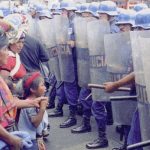PHR began its advocacy work in Mexico in the 1990s, investigating reports of torture and violations of medical neutrality in the state of Chiapas following an attempted uprising by the Zapatista National Army of Liberation. The findings were published in a 1994 report with Human Rights Watch titled “Mexico: Waiting for Justice in Chiapas,” which called upon the Mexican government to end impunity and prosecute those responsible for the crimes.
PHR returned to Chiapas in 2006 to assess the negative impact that ongoing, low-intensity conflict in the country’s southern state was having on the health and human rights of civilians. The report, “Excluded People, Eroded Communities: Realizing the Right to Health in Chiapas, Mexico,” found that the conflict had limited the availability of health services, causing increased maternal mortality, childhood malnutrition, and pulmonary tuberculosis.
PHR continued to do work in 2008, publishing a report that documented the Mexican government’s historic attempt and ultimate failure to implement international standards for forensic evaluations of torture and ill-treatment. Additionally, PHR scientists conducted a forensic review of the investigation by Mexico’s Attorney General into the October 2006 death of American Brad Will, a video-journalist, died of gunshot wounds while covering violent protests in the state of Oaxaca. At issue in this case is whether Will was killed by bullets fired at close range from within the crowd of protestors, or from a greater distance by paramilitary forces. Based on PHR’s review and in light of allegations of corruption and mismanagement of the investigation by Oaxacan authorities, PHR recommended an exhaustive and complete federal-level inquiry into Will’s death and into the deaths of others killed and injured in political violence in Oaxaca between 2006 and 2008.



